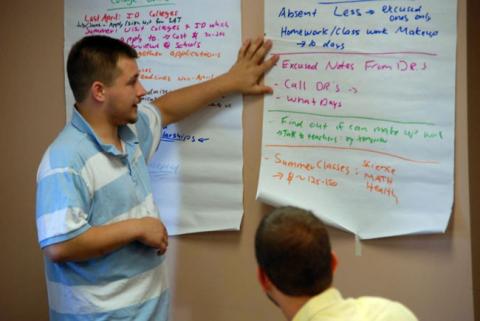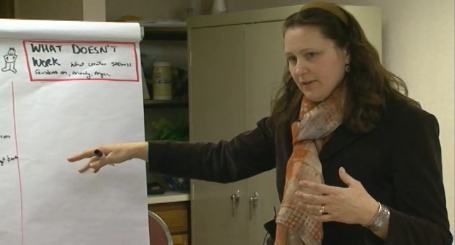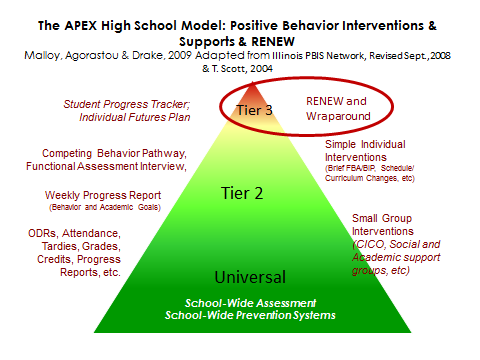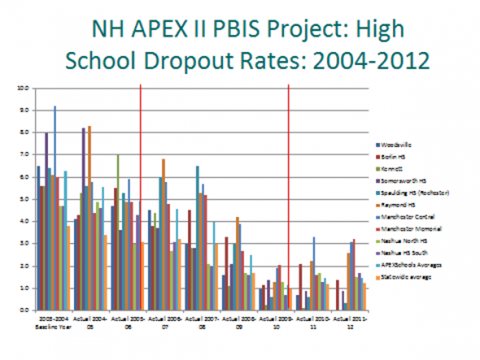The state of New Hampshire has worked with the Institute on Disability since 2002 to implement a Multi-Tiered System of Support (MTSS) focused on behavior in high schools. This initiative, called Achievement in Dropout Prevention and Excellence (APEX), includes implementation of Positive Behavioral Interventions and Supports (PBIS) combined with an individualized school-to-adult-life transition model developed by the IOD.
For more up to date news, trainings, and resources related to PBIS, please visit the RENEW and PBIS projects.
Project Staff
- Kathryn Francouer
Project Director - Joanne Malloy
RESEARCH ASSOCIATE PROFESSOR

APEX
From 2002-2005, the Institute on Disability implemented APEX, a dropout prevention and school improvement program, in two NH high schools. APEX I demonstrated the promise of strategically combining PBIS, RENEW, and Student Leadership (including a student-led needs assessment and action project program where students work with PBIS Universal Teams to assess and improve school climate, safety, and learning) to reduce dropout rates, and improve individual student success and overall school climate.
APEX II
From April 2006 through September 2009, APEX II staff members worked with students, families, teachers, and administrators at 10 high schools and their sending middle schools to adopt and implement these three strategies. Some schools also implemented an 8th to 9th grade transition system in order to reduce the schools’ annual dropout rate, created consistency and predictability in the school environment, developed pro-active strategies based on data and designed to prevent problem behavior and reduce failure rates, created a positive learning environment, used data to make decisions, fostered student leadership, and implemented a research-based individualized school-to-career intervention for the most at risk students. The APEX II school staff members provided training and technical support to the 10 high schools to implement PBIS and RENEW.
APEX III
Based upon its work using the three-tiered Positive Behavioral Interventions and Supports (PBIS) model as a dropout prevention approach during the APEX and APEX II projects (2002-2009), the APEX III project beginning in June 2011, the project builds schoolwide Positive Behavioral Interventions and Supports (PBIS) at the Universal (Tier1), Secondary (Tier 2) and Tertiary (Tier 3) levels in the 7 high schools that have been chosen to participate:
- Campbell High School, Litchfield, NH
- Memorial and West High Schools, Manchester, NH
- Raymond High School, Raymond, NH
- Nute High School, Milton, NH
- Pittsfield High School, Pittsfield, NH
- Pinkerton Academy
By providing training and technical assistance to school teams and staff members using a positive behavioral support problem-solving framework, the plan is to improve the outcomes for all students and reducing the need for segregated programs for students with disabilities and significant behavior support needs.

The primary drop-out prevention component within the APEX Dropout Prevention Model is a comprehensive systems change model called Positive Behavioral Interventions and Supports (PBIS). PBIS is a systemic, data-driven behavioral support and improvement process that consists of three elements, each specifically designed to prevent disruption and address the behavioral support needs of students at risk of school failure:
- School-wide Level: A School-wide Leadership or “Universal” team is formed in each APEX school, and consists of approximately 10-12 teachers, administrators, special educators, parents, and students. An APEX staff member guides the Universal team in its work to evaluate and re-design the discipline systems using the Positive Behavior Supports model; to assess the school’s current behavior profile; to redesign the school’s behavioral expectations; to sharpen the school’s data collection and retrieval systems; and to design and implement school-wide interventions that will benefit all students. Universal Team initiatives are designed to address the needs of the majority of the student body that have the fewest social, behavioral, or academic challenges.
- Secondary Level: APEX schools also develop a secondary level or “Targeted Team” of specialists and administrators that focuses on those students who exhibit challenging behaviors and who are at risk for school failure due to academic, social, or behavioral issues. The goal of this team is to design interventions for the student or group of students based upon a functional and contextual assessment or Functional Behavioral Analysis (FBA). These “function-based” interventions have been proven highly effective in the reduction of problem behaviors and the associated negative consequences.
- Intensive Level: An APEX facilitator trained in an individualized, school-to-career service model called “RENEW” works with staff members at each high school and with specialists from community-based organizations to identify individual students who are struggling to complete their program or who have already dropped out of school. A support team is formed around each student and works with the student to develop individualized, student-directed school-to-career plans designed to help the student earn credit toward graduation through appropriate alternative means.
APEX has been implemented in 17 high schools since 2002. The participating high schools have reduced their dropout rates by 75% (overall statewide dropouts rates have been reduced by 50% during the same time period).
The individualized school-to adult-life transition model that is part of the high school implementation of PBIS is called RENEW (Rehabilitation for Empowerment, Natural supports, Employment, and Work). RENEW has shown promising results in preliminary data analysis for improving outcomes for students who were most disengaged from school and were at risk of dropping out. The schools and project staff have enrolled and served over 140 youth in RENEW.
The IOD specializes in training and coaching in the following areas:
- PBIS implementation
- "Tier" implementation for groups/schools
- Individualized consultation and coaching for groups/schools
- Evidence-based transition planning
- Wraparound support
- RENEW process facilitation
- Annual Summer Leadership Institute for school teams and youth leaders
For more information about training and coaching services, contact Sarah O'Rourke at (603) 228-2084 or sarah.orourke@unh.edu

“…what educators all over the state are learning, is that detentions, three-strikes-and-you're-out rules, corporal punishment (which is banned in New Hampshire schools but still in use in many states), suspensions and other punishments don't work to change the behavior of children and teenagers. That's doubly true when a child has emotional or behavioral issues that cause them to act out, wall themselves off or give up on learning. [There is] an approach that's working at Somersworth High School and at least 10 other schools across the state. It's a comprehensive program of supports for positive behavior and the RENEW system designed to help students on a path to failure set goals for themselves and get the support they need to achieve them.” Concord Monitor Editorial, May 24, 2012

By providing training and technical assistance to school teams and staff members using a positive behavioral support problem-solving framework, there have been improved outcomes for all students and reductions in the need for segregated programs for students with disabilities and significant behavior support needs.
Partners in this work include the NH Center for Effective Behavioral Interventions and Supports (NH-CEBIS), the Parent Information Center of New Hampshire (PIC) and Strafford Learning Center.
- Using Positive Behavioral Interventions and Supports for Dropout Prevention: Lessons from New Hampshire. Appears in the Association for Positive Behavior Support Newsletter May 2012.
- The Efficacy of the Renew Model: Individualized School-to-Career Services for
- Youth At Risk of School Dropout.Journal of At Risk Issues, Vol 15, Iss 2. Available via the National Dropout Prevention Center
- Positive Behavioral Interventions and Supports and Dropout Prevention
- Transition of Secondary Students with Emotional or Behavioral Disorders: Current Approaches for Positive Outcomes. Chapter 10 - The RENEW Model of Futures Planning, Resource Development, and School-to-Career Experiences for Youth with Emotional or Behavioral Disorders. Authors: JoAnne M. Malloy, Jonathon Drake, Kathleen Abate, and Gail M. Cormier